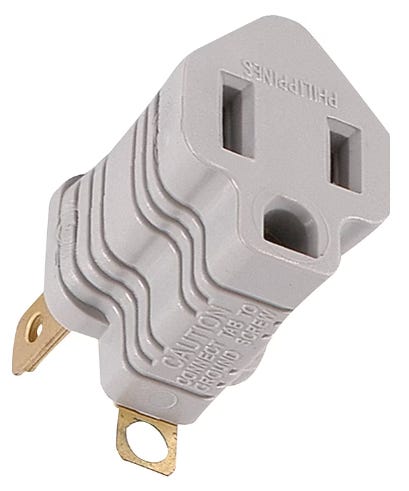Okay so I have no 50 or 30 amp outlet on my house, the heat is propane, I know it takes minor electricity to fire it up. If I plug a heavy duty extension cord into my garage outlet, Will that work for minor electricity like lights and outlets along with firing up the heat? Chad P.
Dear Chad P.
You can do this, but first a few ground rules
Make sure you use a heavy-duty extension cord (as you indicated). You do not want one of those “orange specials” from a big box store. Note that this 100' ft cord shown below is only 16 gauge and rated for 10 amps of current. You’ll want a 12-gauge cord rated for 20-amps of current. And don’t go over 50 ft since 100 ft of extension cord will create too much voltage drop under any significant load.
Watch you total current draw
Be aware that the house outlet you’re plugging into might not be on a dedicated circuit. So if you’re plugging into a garage outlet there might be another load on that same circuit. You’ll probably want to limit total current from the outlet to less than 10 amps or so.
And while you’re add it, make sure whatever you plug into is properly grounded and has a GFCI on the circuit. Whatever you do, DO NOT use one of those ground lift adapters to plug your RV into a non-grounded outlet. That’s how hot-skin voltages happen.
Only turn on the essentials
Electric lights are okay since they’ll be LED and draw only a tiny amount of current. But don’t use any electric space heaters, turn off the electric water heater, and don’t be trying to run the convection microwave oven or air conditioner. But your propane furnace is okay since the blower only draws around 8 amps at 12-volts DC which works out to less than 1 ampere at 120-volts AC through the extension cord.
Lithium battery chargers can draw a lot of current
Be aware that a 100-amp Lithium battery charger can easily draw in excess of 10 amps at 120-volt AC. For example, the MasterVolt 3kW Hybrid inverter/charger in my GeoPro trailer can draw up to 23 amps at 120-volts AC while charging the 400Ah Lithium battery. But the MasterVolt CombiMaster controller does allow me to set the maximum current draw from the shore power line to 10 amps (or whatever I want) and reduce battery charging current. So be careful trying to charge a large Lithium battery bank that’s completely discharged using a high-amperage charger while into an extension cord. You’ll want to monitor and limit total current draw.
Most refrigerators should be okay
A residential refrigerator typically draws around 5 amps at 120-volts AC while running. And an RV 3-way propane furnace on 120-volts AC probably draws 3 or 4 amps at 120-volts AC. So that should be okay on a 12-gauge extension cord.
A watt meter will help you keep track of the current
If you don’t have an advanced surge protector with an amperage monitor, you can plug a watt meter into your house outlet. That will help you monitor total current draw and stay out of trouble. You can get the meter I use for casual wattage and current measurements from Amazon HERE.
That all for now. Keep your 120gauge extension cord under 50 ft, and monitor your total current draw to keep it under 10 amps or so. Use contact cleaner on all plugs and outlet connections, and watch out for any signs of overheating.
Let’s play safe out there… Mike









Hi Mike, Have you heard about these splices? They’re pricing, but I really like the ones that have the tab for screwing the splice down. I don’t think I would want to use them every day, but there are places under my hood where they would work well. spliseal.com
Hi Mike, Have you heard about these splices? They’re pricing, but I really like the ones that have the tab for screwing the splice down. I don’t think I would want to use them every day, but there are places under my hood where they would work well.